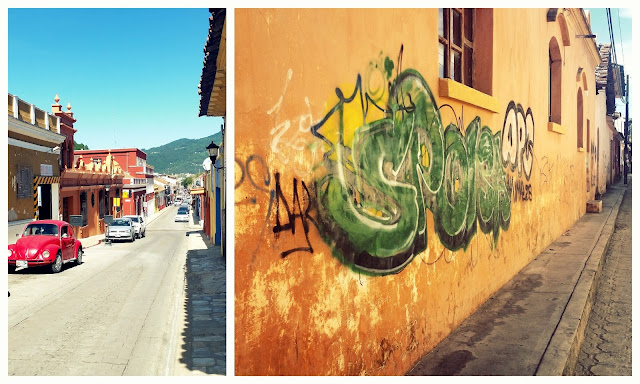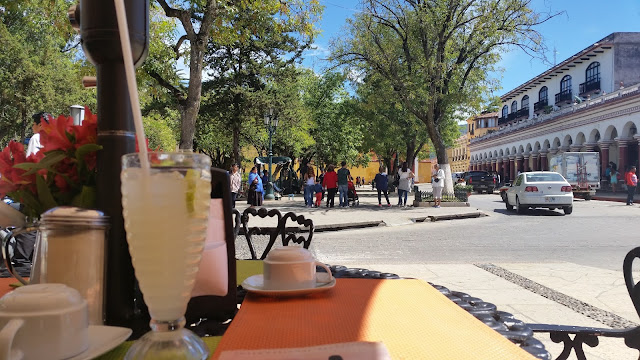Have you ever heard of Chiapas? Chiapas is the southern-most state of Mexico. I had the blessing of being able to visit Mexico for the first time this past June, and such a beautiful area of it. If you ever have the opportunity to go, don't hesitate. To get there, either go from Guatemala by shuttle, or fly to the Mexico City airport and then connect to Tuxtla, Chiapas. From there a vibrant and buoyant town, San Cristóbal de las Casas, is a 45 minute drive. What I remember upon first entering the town in the evening was the flattery of the perfectly lit town, comprising of warm, cream-colored buildings, against the carrying blue layers of twilight.
I learned of this area from my earlier visits to Antigua, Guatemala from helping to run mobile women's health camps there with Humanity First. Travel excursion offices frequently advertised shuttle rides to this beautiful city. After Humanity First Guatemala began making contacts there, through confirmation of some local socially active women, we soon realized the same women's health problems exist in Chiapas, too.
Chiapas has a very similar culture to Guatemala and is unique from the rest of Mexico--it was even annexed from Mexico for a year. It has a complex history filled with brilliant civilizations, war, and oppression. Chiapas had a long history of pre-Mayan civilizations, and this society had even developed a calendar hundreds of years before the Mayan people. The Mayan people then settled there and built a successful empire. After the decline of the Mayan empire, the rule changed between many different groups. Notably, Spanish colonists violently conquested the indigenous population through constant warfare and disease. The Tzotzil group were among the most resistant bur eventually succumbed forming the town that I visited.
The natives there still speak Tzotzil today, as we saw in our Women's Health Camp. This was the reason for my visit. After we conducted several successful women's health camps in central Guatemala, we decided we were ready to initiate these women's health initiatives in Chiapas, Mexico. Like in Guatemala, we provided preventative health services along with medicinal treatment, as needed. We provided cervical cancer screens, topics on preventative health education, and collected research to better customize to the needs of this population, all while using Tzotzil to Spanish and Spanish to English translators. We found new cultural barriers that we had not previously experienced in Guatemala from the Tzotzil culture. It's an ancient and fascinating culture, and we hope to understand it accurately in order to progress in an educated and sensitive way.
Culturally, Chiapas has contributed richly. Jaimes Sabines is a Mexican poet from Chiapas who is regarded as the "sniper of literature" and one of the greatest contemporary poets.
After learning more about this area and seeing images of this magnetic place with similar looks of my beloved city of Antigua, Guatemala, I had no doubt that I would be there soon. I had complete certainty that I would love it at first sight. I did.
I learned of this area from my earlier visits to Antigua, Guatemala from helping to run mobile women's health camps there with Humanity First. Travel excursion offices frequently advertised shuttle rides to this beautiful city. After Humanity First Guatemala began making contacts there, through confirmation of some local socially active women, we soon realized the same women's health problems exist in Chiapas, too.
Chiapas has a very similar culture to Guatemala and is unique from the rest of Mexico--it was even annexed from Mexico for a year. It has a complex history filled with brilliant civilizations, war, and oppression. Chiapas had a long history of pre-Mayan civilizations, and this society had even developed a calendar hundreds of years before the Mayan people. The Mayan people then settled there and built a successful empire. After the decline of the Mayan empire, the rule changed between many different groups. Notably, Spanish colonists violently conquested the indigenous population through constant warfare and disease. The Tzotzil group were among the most resistant bur eventually succumbed forming the town that I visited.
The natives there still speak Tzotzil today, as we saw in our Women's Health Camp. This was the reason for my visit. After we conducted several successful women's health camps in central Guatemala, we decided we were ready to initiate these women's health initiatives in Chiapas, Mexico. Like in Guatemala, we provided preventative health services along with medicinal treatment, as needed. We provided cervical cancer screens, topics on preventative health education, and collected research to better customize to the needs of this population, all while using Tzotzil to Spanish and Spanish to English translators. We found new cultural barriers that we had not previously experienced in Guatemala from the Tzotzil culture. It's an ancient and fascinating culture, and we hope to understand it accurately in order to progress in an educated and sensitive way.
Culturally, Chiapas has contributed richly. Jaimes Sabines is a Mexican poet from Chiapas who is regarded as the "sniper of literature" and one of the greatest contemporary poets.
After learning more about this area and seeing images of this magnetic place with similar looks of my beloved city of Antigua, Guatemala, I had no doubt that I would be there soon. I had complete certainty that I would love it at first sight. I did.
 |
| My first photo on the drive from the airport in Tuxtla, Chiapas. |
 |
| A couple of photos from the first Women's Health Camp by Humanity First Guatemala-USA |
 |
| Morning walks in the beautiful San Cristobal de las Casas |
 |
| Some main sights around central San Cristobal. |
 |
A lemonade and parque central morning in San Cristobal. Sigh.
|
"What are you looking at, though?" Little boy playing in a very impoverished rural area of Chiapas.
Breakfasts in San Cristobal de las Casas
PS: Carajillo Cafe is a requirement for anyone who appreciates coffee.
Also, if you love chocolate, you will love Cacao Nativa, a charming and ADORABLE Mexican chocolatier.
 |
| "No es que muera de amor, muero de ti. Muero de ti, amor, de amor de ti..." Jaime Sabines |
-AB
For more information on women's health efforts abroad with Humanity First and/or to volunteer, please email womenshealth@humanityfirst.gt






Post Comment
Post a Comment